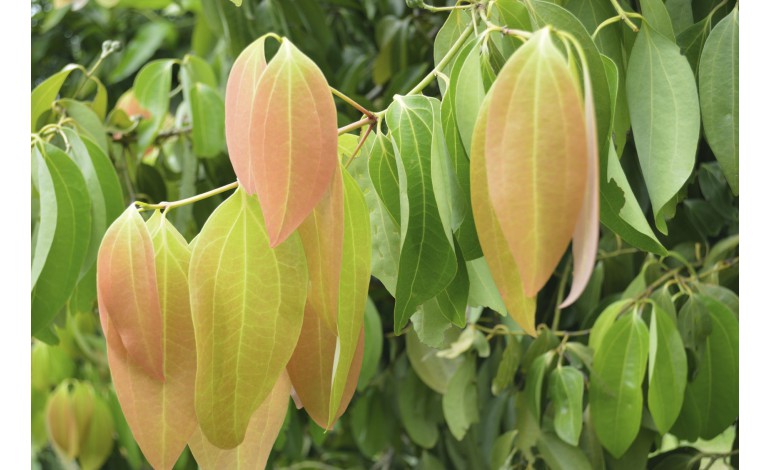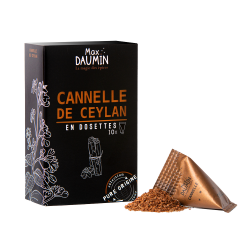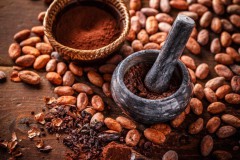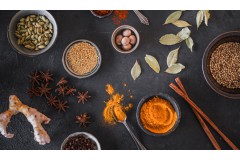The benefits of cinnamon: myth or reality?
If there's one of the world's most popular spices, it's cinnamon. It's found in many dishes, drinks, desserts and pastries. It's also a seasonal spice, coming back with a vengeance every winter, to be found in cakes, cookies and gingerbread, and sometimes even as decoration on our Christmas tables!
For as long as human beings have consumed spices, they have been quick to learn that most of them can be beneficial to the body, and that some can be included in the pharmacopoeia. Cinnamon has been used for centuries in Ayurvedic (Indian) medicine to treat respiratory and digestive problems.
Today, there are hundreds of scientific studies on the subject. Most of them demonstrate the benefits of cinnamon for our health. So what's the reality today?
Health claims about cinnamon can be found all over the internet. They're becoming legion. But what is accepted and proven? What tends to be, and what isn't?
Coumarin in Ceylon cinnamon or cinnamon cassia?
There are two main types of cinnamon on the world market: Ceylon Cinnamon (Cinnamomum verum) and Casse Cinnamon (Cinnamomum Cassia), of which there are several similar cultivars: Saigon Cinnamon (Cinnamomum C. loureiroi) and Indonesian Cinnamon (Cinnamomum burmannii). The latter two have similar characteristics to Chinese Cinnamon Cassia.
Casse Cinnamon contains relatively high concentrations of coumarin, a natural organic compound that could ultimately be harmful to the liver. Casse Cinnamon has a much higher concentration of coumarin than Ceylon Cinnamon (20 to 70 times). However, these differences depend on the terroir, climate, harvesting and storage of the cinnamon. It's hard to get a stable figure.
As a result, results vary from one scientific study to another. There are wide variations in the toxicity of coumarin. Finally, it should be added that coumarin's potential toxicity is not triggered by excessive, regular and permanent consumption.
Ceylon cinnamon, which is rarer, is the most suitable for health purposes, due to its much lower coumarin content. In the absence of tangible proof of the toxicity of coumarin from cinnamon, Ceylon cinnamon is the preferred choice.
Diabetes, cholesterol and Anderson's Apple Pie
In 2003, Dr. Richard Anderson (USDA Human Nutrition Research Center, Beltsville, Maryland) conducted a number of studies on common foods and their influence on blood glucose levels. Studying the effects of cinnamon apple pie, one of America's favorite desserts, Dr. Anderson expected to obtain harmful results. But curiously, the results went the other way!
The sugars and starches in food are broken down into glucose. This glucose then circulates in the bloodstream, where it determines blood sugar levels. Insulin, on the other hand, enables cells to absorb glucose, which is then used as a source of energy or converted into fat.
People with type 1 diabetes do not produce enough insulin. People with type 2 diabetes do secrete insulin, but this hormone is less effective in regulating blood sugar levels. (This type of diabetes is more common than type 1, and mainly affects people over the age of 40). Even apparently healthy people, especially those who are overweight, sedentary or over 25, lose their sensitivity to insulin. Too much glucose in the blood can cause serious long-term damage.
But let's get back to our pie. Why is this cinnamon apple pie of interest to scientists? What surprising results have been discovered?
Cinnamon, a gift for imitation
Dr. Richard Anderson took a closer look at the various ingredients in this tart. Knowing the effects of the known ingredients (sugar, butter, dough, wheat, apples), he turned his attention to the added cinnamon. It turns out that cinnamon contains a water-soluble polyphenolic compound called MHCP. MHCP simply mimics insulin, activating its receptor and acting in synergy with insulin in the cells.
Half a teaspoon of cinnamon a day significantly reduces blood sugar levels in diabetics, according to a new study. The effect, which can be produced even by dipping a cinnamon stick into your tea, could also benefit millions of non-diabetics who have a blood sugar problem but don't know it.Alam Khan, who was a postdoctoral fellow in Anderson's lab, organized a study in Pakistan. Volunteers with type 2 diabetes were given one, three or six grams of cinnamon powder a day after meals. After a few weeks, all had glucose levels averaging 20% lower than the control group. As soon as the cinnamon treatment was stopped, blood glucose levels immediately rose.
Cinnamon has a proven and well-documented benefit on blood sugar levels.cinnamon has additional advantages: it lowers blood levels of fats and “bad” cholesterol, which are also partly controlled by insulin.
“I don't recommend eating more cinnamon buns, or even more apple pie-there's too much fat and sugar,” says Dr. Anderson. “The key is to add cinnamon to what you would normally eat.”
Scientific validation or not?
“I think the strongest evidence so far lies in diabetes and the promise of cinnamon and blood sugar control,” says Dr. Wright (natural treatment researcher Tahoma clinic, Tukwila, USA) , pointing to studies in test tubes and mice and even small studies in people showing that cinnamon helps insulin sensitivity and glucose transport.
“Many studies involved women and men over 60,” said biochemist Amy Stockert, who studies cinnamon at Ohio Northern University's Raabe College of Pharmacy. “Some found positive effects, others did not.”
Dr. Stockert co-authored a study of 18 people with type 2 diabetes that showed cassia cinnamon species was more effective than diet alone in lowering blood sugar. In fact, his study revealed that it was comparable to oral diabetes medications.
Another study of 60 people with type 2 diabetes found that small doses of cinnamon reduced blood sugar and improved LDL, or “bad” cholesterol, triglycerides and total cholesterol. “I like the fact that the amount that showed benefits for blood sugar and cholesterol in this study was 1 to 6 grams, which is a range of half a teaspoon to three teaspoons, or a tablespoon, so it's easy to sprinkle on cereal or in yogurt or use in recipes,” said dietitian Lisa Drayer, who writes about nutrition for CNN. The Food and Drug Administration's recommended limit is 6 grams a day.
But while the future looks bright, the American Diabetes Association urges caution.
“The ADA doesn't think there's enough evidence,” said ADA member Dr. Maryniuk. “A 2013 meta-analysis, which is one of the most rigorous reviews, found that cinnamon had no impact on hemoglobin A1c levels, which is what we look at to measure glycemic control over time. If it had disappeared downward, I'd be more impressed.”
Still, if you want to see if cinnamon works for you, Dr. Maryniuk suggests that people with type 2 diabetes do a self-test. “Do blood glucose tests in pairs,” she said. “Use half a teaspoon in the morning, on fruit, oatmeal or in coffee, and see what happens to your blood sugar before and after you eat. Check again two to three hours later and see if there's a difference.” But keep taking your medication,” she warned. “You don't want to try something to the exclusion of the medication you're taking.”
In short, cinnamon is and inevitably will remain an ally of your health, but the community needs to move forward still to bring irrefutable evidence for official cinnamon treatment.
Dementia, cancer and more
Cinnamon's antioxidant properties are also being studied for their impact on Alzheimer's disease and other dementias.Cinnamaldehyde, a compound responsible for the spice's sweet smell, and epicatechin, a powerful antioxidant also found in blueberries, red wine and chocolate, appear to offer some protection against oxidative stress, a key player in the development of dementia.Another study revealed that a component of Ceylon cinnamon had the same effect. However, the research only took place on mice, rats and laboratory Petri dishes.
“It seems to function as an anti-inflammatory or antioxidant, protecting the body at the cellular level from bad things that happen,” said Dr. Wright, “getting rid of waste and keeping cells healthy.”
Cinnamon research doesn't stop there. Ceylon cinnamon has also been associated with anti-cancer properties in rodents, anti-parasitic effects, improved diabetic neuropathy, lowered blood pressure and wound healing, including liver damage. Studies have shown that cinnamon oil solutions can kill a number of common bacteria, such as streptococcus and E. coli. The National Center for Complementary and Integrative Health is studying the impact of cinnamon on multiple sclerosis.
Using a computer model, biochemist Stockert found that cinnamon was as effective as resveratrol, a red wine antioxidant known for its anti-aging and anti-disease properties, in activating SIRT-1 - also known as the longevity gene due to its role in repairing DNA. “In some cases, it did better than resveratrol,” said Stockert.
So, cinnamon as a health aid?
Based on all this preliminary research, cinnamon's potential seems enormous. But experts warn that it's still too early in the scientific process to suggest cinnamon as a daily supplement.The scientific community is still at an early stage studying the benefits of Cinnamon on our bodies.A lot of research still needs to be done before making solid health claims linking cinnamon. Studies are going in the right direction. The trade, on the other hand, is going in the wrong direction. Many retailers will make claims that are not supported by scientific evidence.
If nothing else, adding cinnamon to your cooking will do your taste buds and your body a world of good!
Max Daumin
Max Daumin spices
Gold 2017-2018 Silver 2020 - 2021 Bronze 2019 | Trophée national de l'épicerie fine
Artisan Producer of the Collège Culinaire de France 2021






